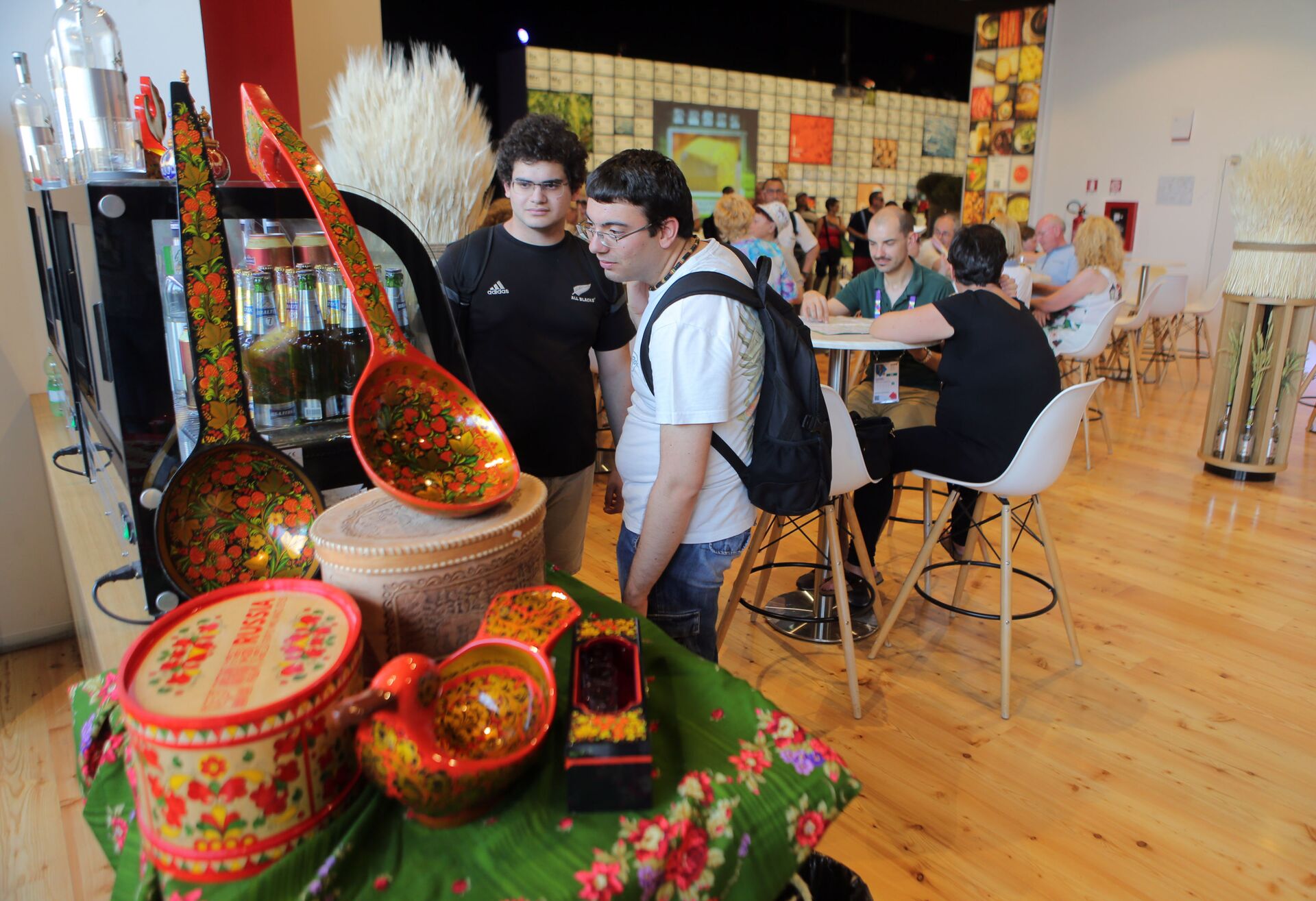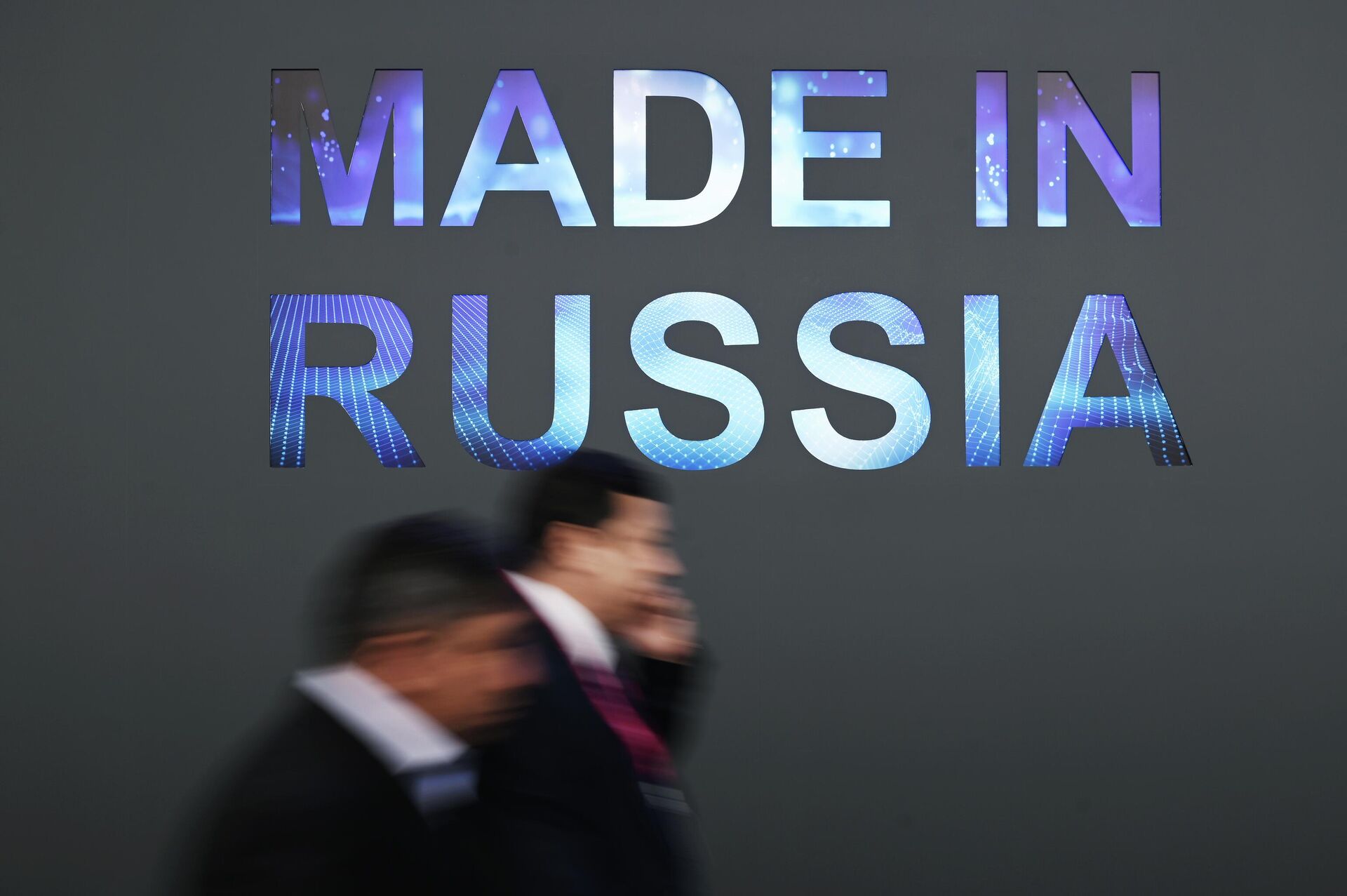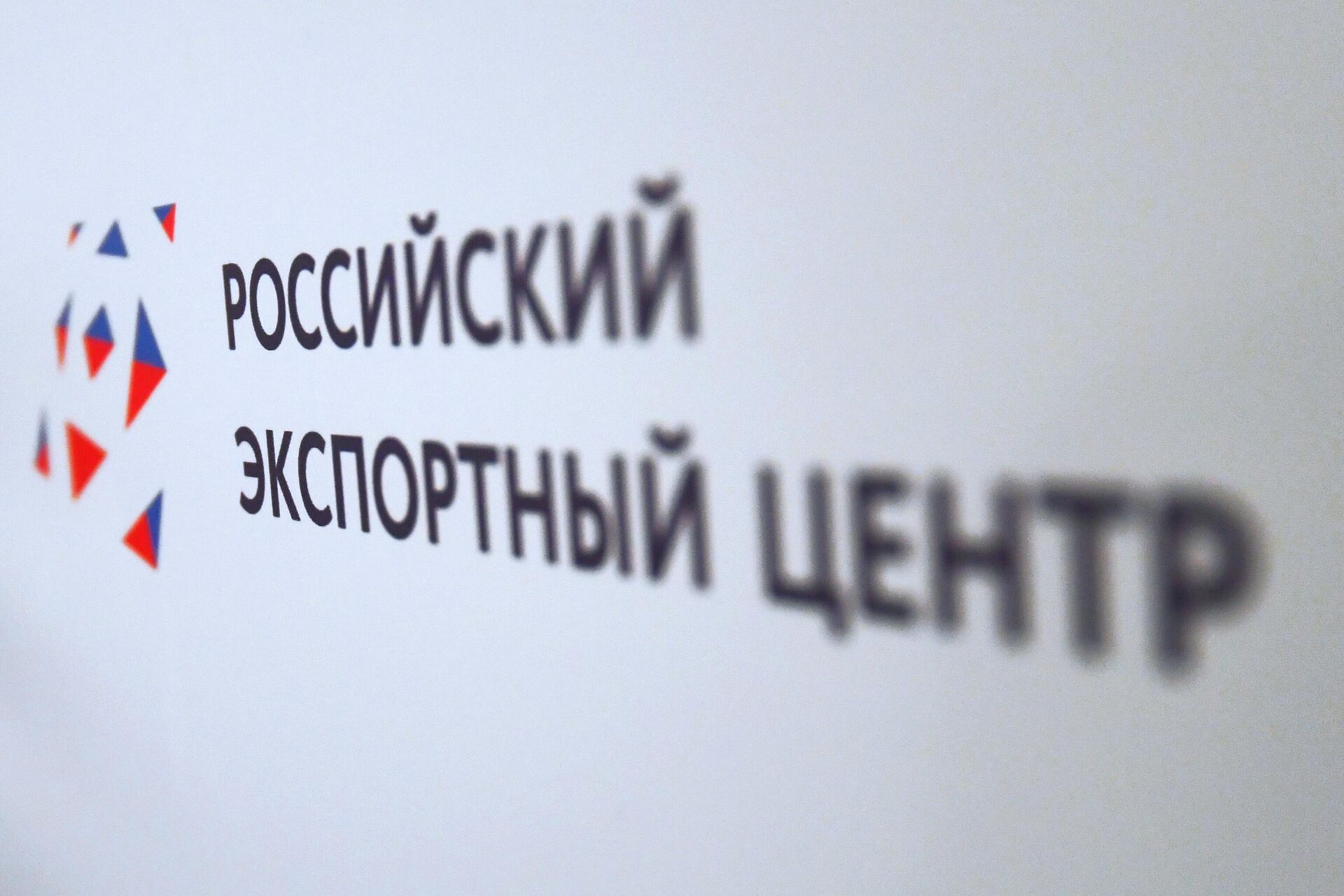https://sputnikglobe.com/20221216/taste-of-success-rec-explains-how-russian-food-pavilions-help-business-captivate-foreign-markets-1105524391.html
Taste of Success: REC Explains How Russian Food Pavilions Help Business Captivate Foreign Markets
Taste of Success: REC Explains How Russian Food Pavilions Help Business Captivate Foreign Markets
Sputnik International
Russian chocolate, condensed milk and sunflower oil are just a few of the products from Russia that foreign buyers have found to their liking. 16.12.2022, Sputnik International
2022-12-16T15:34+0000
2022-12-16T15:34+0000
2022-12-23T10:52+0000
russia
russian export center jsc (rec)
russia
made in russia
egypt
vietnam
https://cdn1.img.sputnikglobe.com/img/07e6/0c/17/1105724705_0:0:1320:742_1920x0_80_0_0_0662967fd329e41fdc48aeabd049bdbe.jpg
Taste of Success: REC Explains How Russian Food Pavilions Help Business Captivate Foreign Markets
Sputnik International
REC Explains How Russian Food Pavilions Help Business Captivate Foreign Markets
For five years, the Russian Export Center (REC) has been implementing a project of tasting and demonstrating pavilions of Russian food products in countries around the world. The main goal of the project is to help Russian producers and foreign consumers find each other.Sputnik discussed the program showcasing the best of the Russian goods with Alexey Solodov, REC vice-president.Sputnik: What are the tasting and demonstration pavilions abroad? What is the goal of this project? What is its purpose?Alexey Solodov: This project was launched in 2017. At some point, it became clear that Russian food products have great potential on the international market. That it is not only vodka, caviar, and blinis but also other high quality and competitively-priced products. These products are of interest to consumers, but it is difficult to promote them in a new market if consumers cannot try them before signing a supply contract.In fact, the first demonstration and tasting pavilion of Russian agricultural products in China, in Shanghai, opened five years ago for this purpose - to help promote Russian agricultural products. We also call these pavilions showrooms.Permanent tasting and demonstration pavilions of Russian agricultural products in foreign countries are platforms that provide exporters with free infrastructure to promote goods in new markets and meet consumers.We are talking about both providing retail and warehouse space, equipment, pavilion maintenance, and stands, as well as assistance in promotion and marketing support, finding potential customers, and holding promotions in the pavilion. This is a place where Russian producers and foreign buyers can find each other, negotiate and taste our products. The latter is very important and helps a lot during negotiations with potential buyers.Today, it is one of the most popular tools for supporting Russian agricultural products abroad.This is a chance for companies that produce high-quality products but have no experience in their chosen market, have not adapted composition, labels, or have no certificates to learn all about how to prepare products and do it with the support of the REC. And for those companies who have already prepared their goods, worked out the logistics and calculated the cost of entering the market, but who have no partners so far, this is an opportunity to find partners interested in Russian products. And for experienced exporters, participation in the showroom promotion program is a tool for marketing development for the business.The point I am making is that pavilions will be useful to any company at any stage of export.Sputnik: What kind of complicated processes does the REC take on in promoting Russian products?Alexey Solodov: The REC's system of demonstration and tasting pavilions abroad, or showrooms, is a comprehensive support for the promotion of agricultural products for Russian producers: from imports to the end consumer.As I said before, we provide assistance at all stages: from registering products for entry into the country to advising on the requirements for imports.Furthermore, producers can place their products for free on the shelves of the pavilion, while we will make free delivery, storage, placement on the online store, and promotion.And most importantly, we will help them find potential partners, distributors, and retail chains that are interested in buying Russian products.Another very important service segment that the pavilion undertakes is free and regular tasting events in retail chains and shopping centers, assistance in promoting goods at these stores, adapting goods to market requirements, and general marketing support.Sputnik: In which countries do these pavilions already operate? What countries do you plan to launch them in the near future?Alexey Solodov: Agribusiness demonstration and tasting pavilions are now operating in China, the UAE, Egypt, and Vietnam. We expect to open new ones in Turkey and Saudi Arabia by the end of the year.They help local buyers establish direct cooperation with Russian food and beverage suppliers, and help Russian exporters find end consumers and get on the shelves of major retail chains.Sputnik: How do these pavilions help promote Russian products abroad? Can you assess the effectiveness of this project?Alexey Solodov: I have already talked about the mechanisms, and as for the efficiency, there are currently more than 1,000 products from some 80 producers displayed in the pavilions.We maintain constant contact with exporters. We receive their feedback and take into account their needs and suggestions to improve the effectiveness of promotion mechanisms abroad. This allows us to improve the promotion program for agribusiness products and introduce into it those tools that exporters really need. This year we have significantly changed the program, and now we continue to re-engineer the pavilions in accordance with business requests.Since September 2022, the REC has been able to finance not only the promotion of products directly through the pavilions, but also their placement in trade and retail chains and on e-commerce platforms, as well as the delivery of demonstration samples of Russian participants to the pavilions and the necessary registration of products in the countries where the pavilions operate.Such measures have been developed at the request of and in cooperation with business, are demanded by exporters, and will allow them to strengthen their position in the countries where the pavilions operate.Sputnik: What products are in demand in these pavilions in the first place? And what chances do the participating companies then have to stay in this market and expand their supply? What does this depend on?Alexey Solodov: Pavilions are tools that help companies establish business contacts and adapt to the market. If the products meet the requirements of buyers and end consumers, then they have the opportunity to gain a foothold in the market and increase supplies. As for the products that are in demand, it depends on the country. For example, confectionery products are popular in the Middle East, Russian condensed milk is popular in Vietnam this year, and our sunflower oil is popular in Egypt.But this does not mean that other products do not need to enter these markets. What kind of products have potential? The REC can also answer this question because we have analytics available on the “My Export” digital platform, which works as a one-stop window for exporters.Sputnik: How can manufacturers participate in the project? What benefits do Russian companies have for placing their products in pavilions?Alexey Solodov: It is quite simple: they only need to apply for participation in the program on the website of the Russian Export Center. The entire package of documents and requirements for products is available in the corresponding section on the site. After this, the company takes part in the competitive selection and, according to the results, it will have the opportunity to place its products in the chosen pavilion and receive all the bonuses from participation in the program.In the near future, we will launch this service online on the “My Export” digital platform, and this will reduce the volume of documents provided by exporters. Previously, companies submitted at least five mandatory documents in paper form. Now they will apply in electronic form, and we will receive all the necessary information via IEIS.The signing of agreements will now be in electronic form, and the period of signing reduced to a maximum of seven days.The commissioning of the digital service and the re-engineering we are doing (working on a new methodology for selecting exporters) will further increase the reach of companies to be hosted in our pavilions through speed, transparency, and convenience at every stage of the service.Sputnik: Can small producers get access to the pavilions? What about representatives of small and medium-sized businesses?Alexey Solodov: It does not matter what size the company is, where it is located, or which market it wants to enter. Any company that produces quality food and other agribusiness products can apply for promotion in showrooms.Sputnik: Has it become more difficult to promote Russian goods abroad due to the geopolitical situation in the world?Alexey Solodov: Agribusiness pavilions are located in countries that we consider as the top export priority and that not only have not reduced but also even increased the demand for Russian agricultural products. Of course, each country's market has its own specifics. China, for example, still has anti-COVID-19 restrictions. But Russian products are of high quality, environmentally friendly, tasty and competitive, and they are very much in demand around the world.
russia
egypt
vietnam
Sputnik International
feedback@sputniknews.com
+74956456601
MIA „Rossiya Segodnya“
2022
Sputnik International
feedback@sputniknews.com
+74956456601
MIA „Rossiya Segodnya“
News
en_EN
Sputnik International
feedback@sputniknews.com
+74956456601
MIA „Rossiya Segodnya“
Sputnik International
feedback@sputniknews.com
+74956456601
MIA „Rossiya Segodnya“
rec to open two more pavilions to promote russian agribusiness abroad
rec to open two more pavilions to promote russian agribusiness abroad
Taste of Success: REC Explains How Russian Food Pavilions Help Business Captivate Foreign Markets
15:34 GMT 16.12.2022 (Updated: 10:52 GMT 23.12.2022) Russian chocolate, condensed milk and sunflower oil are just a few of the products from Russia that foreign buyers have found to their liking.
For five years, the Russian Export Center (REC) has been implementing a project of tasting and demonstrating pavilions of Russian food products in countries around the world. The main goal of the project is to help Russian producers and foreign consumers find each other.
Sputnik discussed the program showcasing the best of the Russian goods with Alexey Solodov, REC vice-president.
Sputnik: What are the tasting and demonstration pavilions abroad? What is the goal of this project? What is its purpose?
Alexey Solodov: This project was launched in 2017. At some point, it became clear that
Russian food products have great potential on the international market. That it is not only vodka, caviar, and blinis but also other high quality and competitively-priced products. These products are of interest to consumers, but it is difficult to promote them in a new market if consumers cannot try them before signing a supply contract.
In fact, the first demonstration and tasting pavilion of Russian agricultural products in China, in Shanghai, opened five years ago for this purpose - to help promote Russian agricultural products. We also call these pavilions showrooms.
Permanent tasting and demonstration pavilions of Russian agricultural products in foreign countries are platforms that provide exporters with free infrastructure to promote goods in new markets and meet consumers.
We are talking about both providing retail and warehouse space, equipment, pavilion maintenance, and stands, as well as assistance in promotion and marketing support, finding potential customers, and holding promotions in the pavilion. This is a place where Russian producers and foreign buyers can find each other, negotiate and taste our products. The latter is very important and helps a lot during negotiations with potential buyers.
Today, it is one of the most popular tools for supporting Russian agricultural products abroad.
This is a chance for companies that produce high-quality products but have no experience in their chosen market, have not adapted composition, labels, or have no certificates to learn all about how to prepare products and do it with the support of the REC. And for those companies who have already prepared their goods, worked out the logistics and calculated the cost of entering the market, but who have no partners so far, this is an opportunity to find partners interested in Russian products. And for experienced exporters, participation in the showroom promotion program is a tool for marketing development for the business.
The point I am making is that pavilions will be useful to any company at any stage of export.
Sputnik: What kind of complicated processes does the REC take on in promoting Russian products?
Alexey Solodov: The REC's system of demonstration and tasting pavilions abroad, or showrooms, is a comprehensive support for the promotion of agricultural products for Russian producers: from imports to the end consumer.
As I said before, we provide assistance at all stages: from registering products for entry into the country to advising on the requirements for imports.
Furthermore, producers can place their products for free on the shelves of the pavilion, while we will make free delivery, storage, placement on the online store, and promotion.
And most importantly, we will help them find potential partners, distributors, and retail chains that are interested in
buying Russian products.Another very important service segment that the pavilion undertakes is free and regular tasting events in retail chains and shopping centers, assistance in promoting goods at these stores, adapting goods to market requirements, and general marketing support.
Sputnik: In which countries do these pavilions already operate? What countries do you plan to launch them in the near future?
Alexey Solodov: Agribusiness demonstration and tasting pavilions are now operating in China, the UAE, Egypt, and Vietnam. We expect to open new ones in Turkey and Saudi Arabia by the end of the year.
They help local buyers establish direct cooperation with Russian food and beverage suppliers, and help Russian exporters find end consumers and get on the shelves of major retail chains.
Sputnik: How do these pavilions help promote Russian products abroad? Can you assess the effectiveness of this project?
Alexey Solodov: I have already talked about the mechanisms, and as for the efficiency, there are currently more than 1,000 products from some 80 producers displayed in the pavilions.
We maintain constant contact with exporters. We receive their feedback and take into account their needs and suggestions to improve the effectiveness of promotion mechanisms abroad. This allows us to improve the promotion program for agribusiness products and introduce into it those tools that exporters really need. This year we have significantly changed the program, and now we continue to re-engineer the pavilions in accordance with business requests.
Since September 2022, the REC has been able to finance not only the promotion of products directly through the pavilions, but also their placement in trade and retail chains and on e-commerce platforms, as well as the delivery of demonstration samples of Russian participants to the pavilions and the necessary registration of products in the countries where the pavilions operate.
Such measures have been developed at the request of and in cooperation with business, are demanded by exporters, and will allow them to strengthen their position in the countries where the pavilions operate.
Sputnik: What products are in demand in these pavilions in the first place? And what chances do the participating companies then have to stay in this market and expand their supply? What does this depend on?
Alexey Solodov: Pavilions are tools that help companies establish business contacts and adapt to the market. If the products meet the requirements of buyers and end consumers, then they have the opportunity to gain a foothold in the market and increase supplies. As for the products that are in demand, it depends on the country. For example, confectionery products are popular in the Middle East, Russian
condensed milk is popular in Vietnam this year, and our sunflower oil is popular in Egypt.
But this does not mean that other products do not need to enter these markets. What kind of products have potential? The REC can also answer this question because we have analytics available on the “My Export” digital platform, which works as a one-stop window for exporters.
Sputnik: How can manufacturers participate in the project? What benefits do Russian companies have for placing their products in pavilions?
Alexey Solodov: It is quite simple: they only need to apply for participation in the program on the website of the Russian Export Center. The entire package of documents and requirements for products is available in the corresponding section on the site. After this, the company takes part in the competitive selection and, according to the results, it will have the opportunity to place its products in the chosen pavilion and receive all the bonuses from participation in the program.
In the near future, we will launch this service online on the “My Export” digital platform, and this will reduce the volume of documents provided by exporters. Previously, companies submitted at least five mandatory documents in paper form. Now they will apply in electronic form, and we will receive all the necessary information via IEIS.
The signing of agreements will now be in electronic form, and the period of signing reduced to a maximum of seven days.
The commissioning of the digital service and the re-engineering we are doing (working on a new methodology for selecting exporters) will further increase the reach of companies to be hosted in our pavilions through speed, transparency, and convenience at every stage of the service.
Sputnik: Can small producers get access to the pavilions? What about representatives of small and medium-sized businesses?
Alexey Solodov: It does not matter what size the company is, where it is located, or which market it wants to enter. Any company that produces quality food and other agribusiness products can apply for promotion in showrooms.
Sputnik: Has it become more difficult to promote Russian goods abroad due to the geopolitical situation in the world?
Alexey Solodov: Agribusiness pavilions are located in countries that we consider as the top export priority and that not only have not reduced but also even increased the demand for Russian agricultural products. Of course, each country's market has its own specifics. China, for example, still has anti-COVID-19 restrictions. But Russian products are of high quality, environmentally friendly, tasty and competitive, and they are very much in demand around the world.




